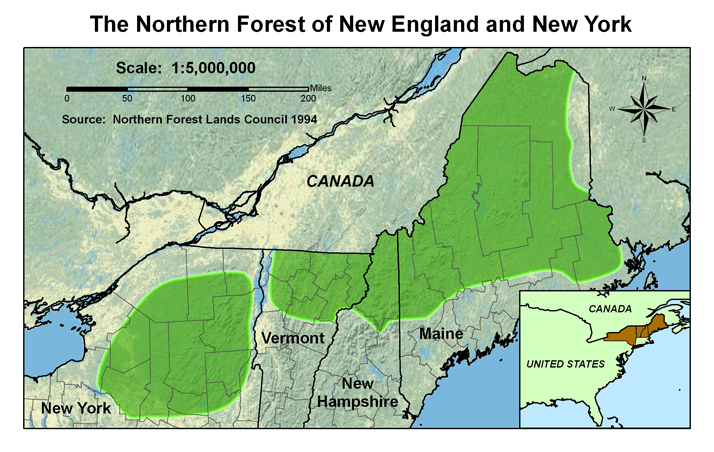The Northeastern States Research Cooperative (NSRC) is a competitive grant program for Northern Forest research, jointly directed through the USDA Forest Service, Northern Research Station, the Hubbard Brook Research Foundation, and a designated institution in each of the four Northern Forest states: the Rubenstein School of Environment and Natural Resources at the University of Vermont, the University of New Hampshire, the Center for Research on Sustainable Forests at the University of Maine, and the State University of New York College of Environmental Science and Forestry. Since 2001, the NSRC has awarded more than 300 research grants, totaling more than $23 million, to researchers throughout the region.
View this 2024 NSRC fact sheet (PDF) which provides an overview of the research program.
Mission
The NSRC supports cross-disciplinary, collaborative research in the Northern Forest — a 26-million acre working landscape that is home to about two million residents and stretches from eastern Maine through New Hampshire and Vermont and into northern New York. Broad research goals are stipulated in the NSRC congressional authorization (Public Law 105-185). A central component of the program is the importance of the Northern Forest to society and the need for research activities to have relevance and benefit to "the people who live within its boundaries, work with its resources, use its products, visit it, and care about it."

History
The history of the Northeastern States Research Cooperative (NSRC) traces back more than two decades. In the 1980s, the unique Northern Forest region — a 26-million acre working landscape with unique recreation opportunities, vast forested watersheds, and a diversity of northern wildlife — was elevated as a priority for national protection when concerns arose that remaining forest land and its timber were being lost to unplanned fragmentation and real estate speculation.
At that time, the governors of Vermont, New Hampshire, Maine, and New York turned to the region's congressional delegations to formally create the Northern Forest Lands Council (NFLC) in order to address these land-use change and community concerns. In 1994, the NFLC published Finding Common Ground: Conserving the Northern Forest (PDF) which, among other priorities, called for the formation of a four-state research cooperative to develop a better understanding of the region's social, economic, and environmental challenges. The congressional authorization for the Northeastern States Research Cooperative was passed as part of Public Law 105-185.
2001–2016
The first year of funding through the NSRC authorization (2001) was to the Hubbard Brook Project of the USDA Forest Service Northern Research Station and focused on ecosystem studies. The funds were distributed in collaboration with the Northeastern Ecosystem Research Cooperative, an independent research group with strong partnership and interest in the NSRC program.
Subsequent years of funding from 2002 on — to both the Hubbard Brook Project and to the Rubenstein School of Environment and Natural Resources at the University of Vermont — continued to support ecosystem research and expanded to include studies of social and economic issues in the Northern Forest.
The original NSRC Charter (PDF) was drafted and signed by the Executive Advisory Board of the NSRC in 2004 and was revised in 2008. This document created the structure, governance, and guidelines for the four-state research cooperative.
During 2005, we were pleased to add a third theme at the Center for Research on Sustainable Forests at the University of Maine. As a partner in the NSRC, Maine hosted a research theme on forest productivity and forest products in the RFP process for the first time in 2006. In 2008, we added a fourth theme at the State University of New York College of Environmental Science and Forestry which expanded our research programs to include studies of biodiversity and protected areas management. Up until 2016, NSRC research was awarded through one of four Research Themes.
From 2001 to 2016, NSRC was a critically important source of funding for applied forest research and outreach efforts throughout the Northern Forest. The program supported more than 335 research projects across 50 organizations and hundreds of landowners and managers, conservation groups, government staff, and private citizens. NSRC developed original data, predictive tools, and recommendations to manage, protect, and monitor essential natural resources in a regional culture and economy that depends on a healthy, working Northern Forest.
2017–2018
In 2018, NSRC released a comprehensive Business Report on the program’s contributions to generation of knowledge about the environment and the economy of the Northern Forest over the previous 16 years.
- 2018 Business Report (PDF)
- 2018 Press Release (PDF) announces the Business Report.
- 2017 Presentation of survey results (PDF) used to compile the Business Report.
2020–Present
In 2020, Congress reinstated funding to support the ecosystem and economics of the Northern Forest through NSRC. NSRC 2.0 puts science to work across the Northern Forest in support of a vibrant and thriving economy and culture, rooted in forest health. NSRC continues to support and disseminate cross-disciplinary, collaborative ecosystem, socio-economic, forest product, and conservation research that benefits the unique landscapes and communities of the Northern Forest region.
- 2022 NSRC Fact Sheet (PDF) provides an overview of the research program and a list of current projects.
- 2022 revised NSRC Charter (PDF) includes a description of the NSRC Indigenous Forest Knowledge Fund to advance Traditional Ecological Knowledge.
- 2021 NSRC Fact Sheet (PDF) provides an overview of the research program.
- 2021 Annual Report (PDF) covers 2019–2021 and showcases the program's revitalization progress and scientific contributions to the economy and culture of the Northern Forest.
- 2020 poster (PDF) displays results published in the 2018 Business Report and upcoming research opportunities.
- 2020 revised NSRC Charter (PDF) describes new governance and operational principles.
